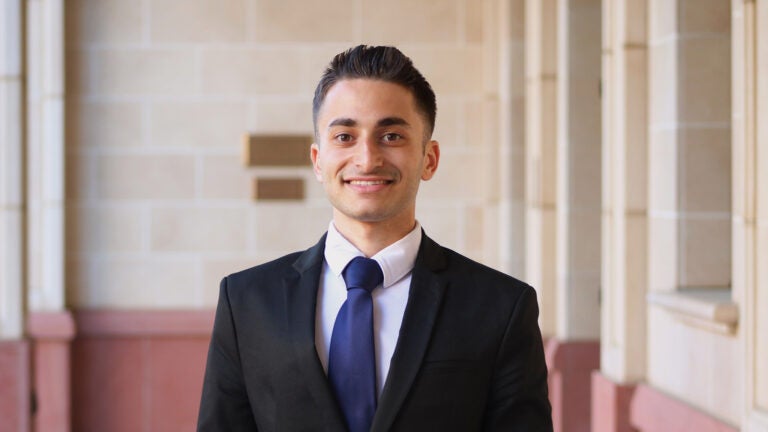
Graduating sociology major founded USC’s first group for students of Middle Eastern/North African descent
As he grew up, tabbouleh, dabke and sprinkles of family conversations in Arabic set Anthony Khoory slightly apart from many of his peers in predominantly white Watertown, Massachusetts. But with a mom who frets over whether he is eating well at college and a father who teaches him how to behave on a date — well, sometimes people of varied backgrounds are not so different after all.
The blending of various influences in his life is something Khoory reflects on quite a bit, having a foot in several worlds.
His mother is originally from Syria, his father is from Iraq and his paternal grandmother is Lebanese, so the foods, folk tales and music of the Middle East permeated his childhood.
But aside from a trip to Syria as a child, Khoory grew up in Massachusetts and spoke English, attended the local schools and engaged in the same day-to-day activities as his friends.
And being non-Arab Christians, his family was part of what Khoory describes as a very present but sometimes overlooked Middle Eastern group.
Now, as he graduates with a bachelor’s degree in sociology from the USC Dornsife College of Letters, Arts and Sciences, Khoory reflects on how his distinctive upbringing combined to shape his time at USC and his future aspirations.
“It wasn’t always apparent how much my background mattered to me until I saw it for what it was and appreciated it. I realized it in high school, and that led to me deciding to study sociology in college,” Khoory says. “I want to combine my interest in social issues, like racism and poverty, with my love of different cultures and my passion for my cultural nuances.”
Studying the interplay of cultures defined Khoory’s time at the university, in his coursework and outside the classroom.
A few years ago he formed a club for Middle Eastern and North African (MENA) students at USC, and last fall he and USC Dornsife sophomore Nour Myra Geha established the Middle Eastern North African Student Assembly(MENASA), a part of the Undergraduate Student Government that includes funding, a dedicated staff member and other resources.
“I came to USC and noticed that many other cultural or racial or ethnic groups had a center, and we didn’t,” he says. “We wanted to validate and encourage the Middle Eastern and North African identities of students from these backgrounds because it has often been invisible. But we are here, and being publicly proud of who we are is OK.”
Individually connected
Khoory’s journey to better understand his roots started with his efforts to learn Arabic, a language he grew up understanding (his mother spoke a Syrian dialect at home) but one in which he was not fluent. He credits his courses at USC — and many later conversations with his mother — with giving him the skills to understand it more fully, particularly the modern standard Arabic that is used in news broadcasts and religious texts.
“It has just opened me up to a beautiful world. The more languages you know, the more people you can connect with and the more sides of yourself you start to discover,” Khoory says. He even noticed subtle changes in how his mother or other native Arabic speakers might open up slightly more when speaking Arabic, whether to confide or laugh or simply share.
Although not all of the members of MENA and MENASA spoke a language from the region, there were other shared elements that gave people in the groups an important sense of community, Khoory notes. Events featuring foods from the regions sparked recollections of childhoods that had many common threads.
Understanding the ties of the community was essential to his time at USC, his studies and self-discovery, he says.
Khoory hopes to take some time off after graduation to consider his career path. After working several jobs during the school year and leading MENA and MENASA, he feels a pause is necessary to fully chart a course.
He and his family are going to Lebanon soon, to stay at his grandmother’s house.
He also wants to shadow an attorney involved with human rights and to volunteer with a mental health hotline to deepen his understanding of where the needs of various communities lie.
But his real passion lies with understanding the nuances of what separates — and binds —us all. He cites a recent popular MENA event where students learned about the dabke, a Middle Eastern dance in which a line or circle of people stamp their feet to a background beat.
“I read the dance began in the villages, people stamping on clay or soil to make it compact, then they combined it with the local drums and rhythms, and it’s something that people do together but can add their own twists,” he said. “It shows that we are diverse, but we are one, and I love that.”